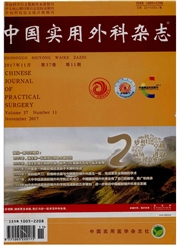

 中文摘要:
中文摘要:
目的 了解早期胃癌术后复发、转移特点及其影响因素。方法 回顾性分析中国医科大学附属第一医院肿瘤外科1980年1月至2012年9月间行根治手术并获随访的629例早期胃癌病人的临床资料。总结其存活率、复发率,复发、转移特点,运用单因素和多因素分析方法,寻找影响早期胃癌术后复发、转移的临床病理因素。结果 全组因肿瘤复发、转移死亡者共31例(4.9%),其中血行转移占54.8%,依次为肝、肺、脑、骨等器官转移,多发生在术后5年内;其次为淋巴结、腹膜转移和残胃复发癌等。全组病例不同年间无瘤存活率和总存活率分别为:5年为94.0%和81.0%,10年为91.0%和64.0%,15年为89.0和52.0%,20年为89.0%和47.0%,25年为89.0%和33.0%。多因素分析表明,脉管癌栓阳性、伴有第二站及以远淋巴结转移者术后复发、转移风险明显高于对照组。结论 早期胃癌术后主要以血行复发、转移为主,多发生在术后5年内;脉管癌栓阳性、伴有第2站及以远淋巴结转移者术后复发、转移风险明显增高。
 英文摘要:
英文摘要:
Objective To evaluate the recurrence rate, patterns and influenced factors on early gastric cancer (EGC) after radical resection. Methods The clinical data of 629 patients with EGC underwent gastrectomy, lymphadenectomy and follow-up between January 1980 and September 2012 in Department of Surgical Oncology, the First Hospital of China Medical University were analyzed retrospectively. The recurrent rate, type, survival rate and influenced factors were evaluated by univariate and multivariate analysis. Results A total of 31 patients (4.9%) had recurrence during the follow-up. Hematogenous metastasis such as liver, lung, brain and bone represented the predominant pattern of relapse, accounting for over half (54.8%), and most of which occurred within five years after surgery. The other recurrence patterns were lymph node metastasis, peritoneal dissemination and remnant gastric cancer. The 5-year, 10-year, 15-year, 20-year and 25-year tumor free survival rate and overall survival rate for EGC was 94.0% and 81.0%, 91.0% and 64.0%, 89.0% and 52.0%, 89.0% and 47.0%, 89.0% and 33.0%, respectively. The multivariate analysis showed that patients with lymphovascular invasion and N2 lymph node metastasis according to Japanese Criteria of Gastric Cancer (JCGC) had the higher risk of recurrence and metastases than patients in the control group. Conclusion Hematogenous recurrence is the major mode of relapse and most of which occur within five years after surgery in EGC. The patients with positive lymphovaseular invasion and N2 lymph node metastasis according to JCGC are apt to relapse.
 同期刊论文项目
同期刊论文项目
 同项目期刊论文
同项目期刊论文
 期刊信息
期刊信息
